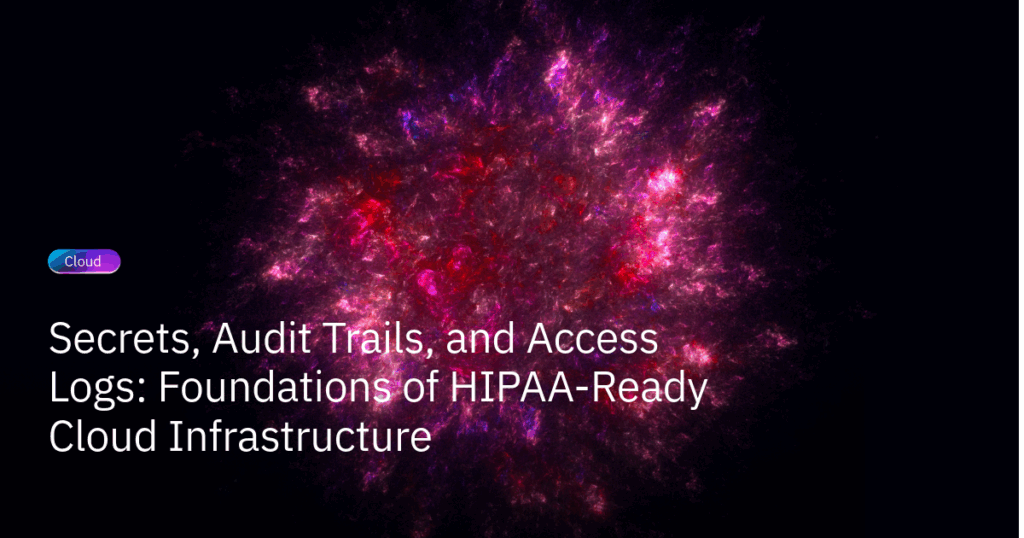
When startups in healthcare hit growth mode, the most overlooked elements of their cloud infrastructure are often the ones that matter most in the eyes of HIPAA. While features and scaling take center stage, the security scaffolding—secrets management, audit trails, and access logging—can determine whether you’re compliant or vulnerable.
This blog takes a closer look at these essential pillars. We’ll break down what they mean, why they matter, and how to implement them without crushing developer speed. Whether you’re building from scratch or tightening up for an audit, these practices form the bedrock of a HIPAA-aligned deployment strategy.
Why These Three Pillars Are Non-Negotiable
Secrets, logs, and trails might sound like backend noise. But in regulated environments, they’re your frontline defense and your legal receipts. HIPAA doesn’t require specific tools—but it does demand that every access to Protected Health Information (PHI) is tracked, every secret is protected, and every event is auditable.
Here’s why each pillar matters:
- Secrets Management ensures credentials, tokens, and keys aren’t floating in code or chat threads.
- Audit Trails create a chronological record of system events, proving due diligence and aiding incident response.
- Access Logs provide granular insight into who touched what, when, and how.
Together, they turn cloud infrastructure from an opaque black box into an accountable, secure system that can pass audits and repel breaches.
Secrets Management: More Than Just Vaulting Keys
Most early-stage teams start with environment variables and shared config files. It’s simple—but dangerously brittle. Secrets leak fast when left unmanaged. Accidental Git pushes, copy-paste mistakes, or overly permissive access can expose databases, APIs, and PHI.
A robust secrets management strategy includes:
- Centralized secret storage, isolated from application code
- Versioning and rotation, so secrets aren’t stale or reused
- Access control, ensuring only the right services and people get access
- Auditability, so every access is logged and reviewable
The gold standard tools (like HashiCorp Vault or AWS Secrets Manager) offer this—but are often complex to configure. For teams shipping fast, simplicity is key. Look for solutions that integrate with CI/CD and make secret injection seamless.
Audit Trails: The Chain of Custody for Your Infrastructure
Audit trails are chronological logs that record system activity: deployments, configuration changes, login attempts, data access, and more. Think of them as a tamper-evident timeline.
HIPAA auditors love audit trails because they reveal whether an organization is in control of its environment. But many startups treat them as an afterthought—collecting logs but not centralizing them, or storing them in ways that aren’t immutable.
To meet compliance and security standards, audit trails should be:
- Comprehensive: Capturing events across infrastructure, apps, and users
- Immutable: Stored in append-only formats with protections against deletion
- Correlated: With timestamps and user/session context for each event
- Reviewed: Integrated with alerting or regular compliance checks
Without audit trails, proving you followed protocol in a breach is nearly impossible. Worse, investigating incidents becomes guesswork.
Access Logging: Visibility Without Surveillance
Access logs capture who accessed which resource, when, from where, and how. In cloud-native systems with microservices and federated identities, access sprawl can get out of hand quickly.
Startups often underestimate how many layers need logging: web apps, APIs, storage buckets, databases, even CLI sessions. Each one should produce logs with:
- User ID or service identity
- Timestamp and duration
- IP address or location metadata
- Action performed (e.g., read, write, delete)
The goal isn’t to spy—it’s to create accountability and enable forensic clarity if something goes wrong. Well-structured access logs are also a goldmine for detecting anomalous behavior, like off-hours access or credential misuse.
Don’t Let Logging Overwhelm You: Start with Opinionated Defaults
One of the biggest blockers to implementing good security practices is choice paralysis. Which logging tool? How to store logs? What level of verbosity? These questions slow teams down.
This is where opinionated defaults come in. Instead of infinite flexibility, startups benefit from platforms that make the right decisions out of the box:
- Logs stored in immutable, compliant-friendly formats
- Secrets encrypted and injected automatically into runtime environments
- Access logging configured by default with identity provider integrations
It’s not about reinventing the wheel—it’s about picking a wheel that’s already round and ready to roll.
How Revolte Bakes Security into the Fabric of Deployment
Revolte exists to remove friction from secure, compliant cloud deployment. For startups juggling speed and regulation, we make the hard stuff simple and the essential stuff automatic.
Here’s how Revolte handles secrets, audit trails, and access logs:
- Secrets Management: Encrypted secrets vault with automatic injection into containers at runtime, no hardcoded credentials ever.
- Audit Trails: Immutable event logging across deployments, infrastructure changes, and user activity—centrally stored and queryable.
- Access Logs: Identity-aware logging tied to SSO providers, with real-time insights and anomaly detection baked in.
All of this is built into the platform—not optional, not hidden behind add-ons. Just secure by default.
From Security Debt to Security by Design
When security infrastructure is an afterthought, it becomes debt—expensive to fix, dangerous to ignore. But when secrets, trails, and logs are part of your platform’s foundation, security becomes a design principle.
For healthtech startups under HIPAA, these practices aren’t optional—they’re existential. But they don’t have to slow you down. With the right tools and defaults, you can build systems that are both fast and fortified.
Final Thoughts: Build Trust Through Transparent Infrastructure
Patients won’t see your logs. Auditors might. But your team will feel the difference when infrastructure is accountable, not opaque.
By investing early in secrets management, audit trails, and access logging, you’re not just checking boxes—you’re building trust. With users. With partners. And with yourself.
Ready to stop duct-taping your security stack? Book a demo to see how Revolte makes HIPAA-compliant deployments fast, automatic, and reliable.